Best Fetcher Alternatives in 2026: 11 Tools for Faster, More Effective Hiring

Is Fetcher’s occasional glitches and complex profile accuracy driving you up the wall? Frustrated by the time-consuming detailed inputs and manual adjustments needed? If you’re looking for a more intuitive interface, robust reporting function, and a tool that can provide a higher volume of profiles quickly, then it’s time to consider Fetcher alternatives. An effective applicant tracking system (ATS) can streamline the hiring process and improve efficiency.
What to Look for in Fetcher Alternatives
When searching for Fetcher alternatives, there are several key factors to consider to ensure you choose a platform that meets your talent acquisition needs effectively.
the best candidates faster
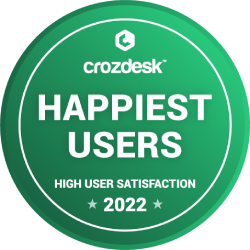
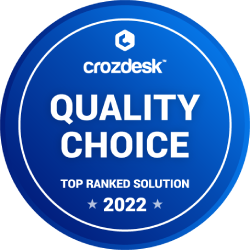

-
Talent Management: Opt for a platform that offers comprehensive talent management capabilities. This includes not only talent acquisition but also talent development and retention. A holistic approach ensures you can manage the entire talent lifecycle seamlessly.
-
Talent Acquisition Management Tools: Look for platforms that provide a robust set of talent acquisition management tools. These should include job advertising, candidate sourcing, and applicant tracking systems to streamline your hiring process and improve efficiency.
-
Dedicated Customer Success Managers: Having dedicated customer success managers can make a significant difference. They provide personalized support and guidance, helping you maximize the platform’s potential and achieve your talent acquisition goals.
-
Entire Talent Management Lifecycle: Choose a platform that supports the entire talent management lifecycle, from recruitment to onboarding and beyond. This ensures continuity and consistency in managing your workforce.
-
Hiring Process: Consider platforms that streamline the hiring process, making it easier to find, attract, and hire top talent. Look for features like automated workflows, AI-driven candidate matching, and integrated communication tools.
-
Complete Talent Acquisition Platform: A complete talent acquisition platform should encompass recruitment marketing, candidate sourcing, and applicant tracking systems. This integrated approach helps you manage all aspects of talent acquisition from a single platform.
-
Sales and Marketing Teams: Ensure the platform is designed to support the needs of sales and marketing teams. Tools for job advertising and candidate sourcing can help these teams attract the right talent efficiently.
-
HR and Recruitment Teams: Opt for a platform tailored to the needs of HR and recruitment teams. Features like talent management and applicant tracking are crucial for these professionals to manage their workflows effectively.
-
Global Talent Market Data: Access to global talent market data is invaluable. It helps you make informed decisions about your talent acquisition strategy by providing insights into market trends and candidate availability.
-
Central Talent Acquisition Platform: A central talent acquisition platform simplifies the management of your talent acquisition process. It consolidates all tools and data in one place, enhancing efficiency and collaboration.
Fetcher Alternatives by Business Size
Fetcher alternatives can be categorized based on the size of your business, ensuring you choose a platform that aligns with your specific needs and resources.
-
Small Businesses: For small businesses, affordability and ease of use are paramount. Look for platforms that offer cost-effective pricing plans and intuitive interfaces. These platforms should provide essential features without overwhelming complexity, allowing small teams to manage their hiring processes efficiently.
-
Medium-Sized Companies: Medium-sized companies often require more advanced features and scalability. Consider platforms that offer robust talent management capabilities, including advanced analytics, automated workflows, and integration with other HR systems. Scalability is crucial to accommodate growth and changing needs.
-
Large Enterprises: Large enterprises need comprehensive talent management solutions with dedicated customer success managers. These platforms should support complex hiring processes, offer extensive customization options, and provide advanced reporting and analytics. Dedicated customer success managers can help large organizations navigate the platform’s features and optimize their talent acquisition strategies.
Key Features and Functionality
When evaluating Fetcher alternatives, it’s essential to consider the key features and functionality that will best support your talent acquisition efforts.
-
Applicant Tracking Systems: Look for platforms that offer robust applicant tracking systems (ATS). An effective ATS streamlines the hiring process by managing job postings, applications, and candidate communications in one place.
-
Job Advertising: Consider platforms with strong job advertising capabilities. These tools help you reach a wider audience by posting job openings across multiple job boards and social media platforms, increasing your chances of attracting top talent.
-
Candidate Sourcing: Opt for platforms that excel in candidate sourcing. Advanced sourcing tools can help you find and engage with potential candidates, even those who are not actively looking for new opportunities.
-
Recruitment Marketing: Choose platforms that offer recruitment marketing capabilities. These tools help you create and manage campaigns to attract and engage top talent, enhancing your employer brand and improving candidate experience.
-
Talent Management: Ensure the platform provides comprehensive talent management features, including talent development and retention. This holistic approach helps you manage your workforce effectively and support their growth within the organization.
-
HR and Recruitment Professionals: Consider platforms designed to support the needs of HR and recruitment professionals. Features like automated workflows, advanced analytics, and integration with other HR systems can significantly enhance their efficiency and effectiveness.
-
Global Talent Market Data: Look for platforms that provide access to global talent market data. This data helps you make informed decisions about your talent acquisition strategy by offering insights into market trends, salary benchmarks, and candidate availability.
100Hires
100Hires is a very popular ATS among small and mid-sized companies, it holds numerous G2 badges, including ‘Leader’ in Recruitment Marketing and Candidate Relationship Management, ‘Most Implementable’ for Small-Business and Mid-Market, and ‘Best Usability’ across multiple categories. It is also recognized as a leading hr talent acquisition software that streamlines the recruitment process with features like candidate management and automated communication. Ready to experience 100Hires? Get a demo or start your free trial today to see how 100Hires can optimize your hiring process. For more information on plans and options, check out our pricing page.
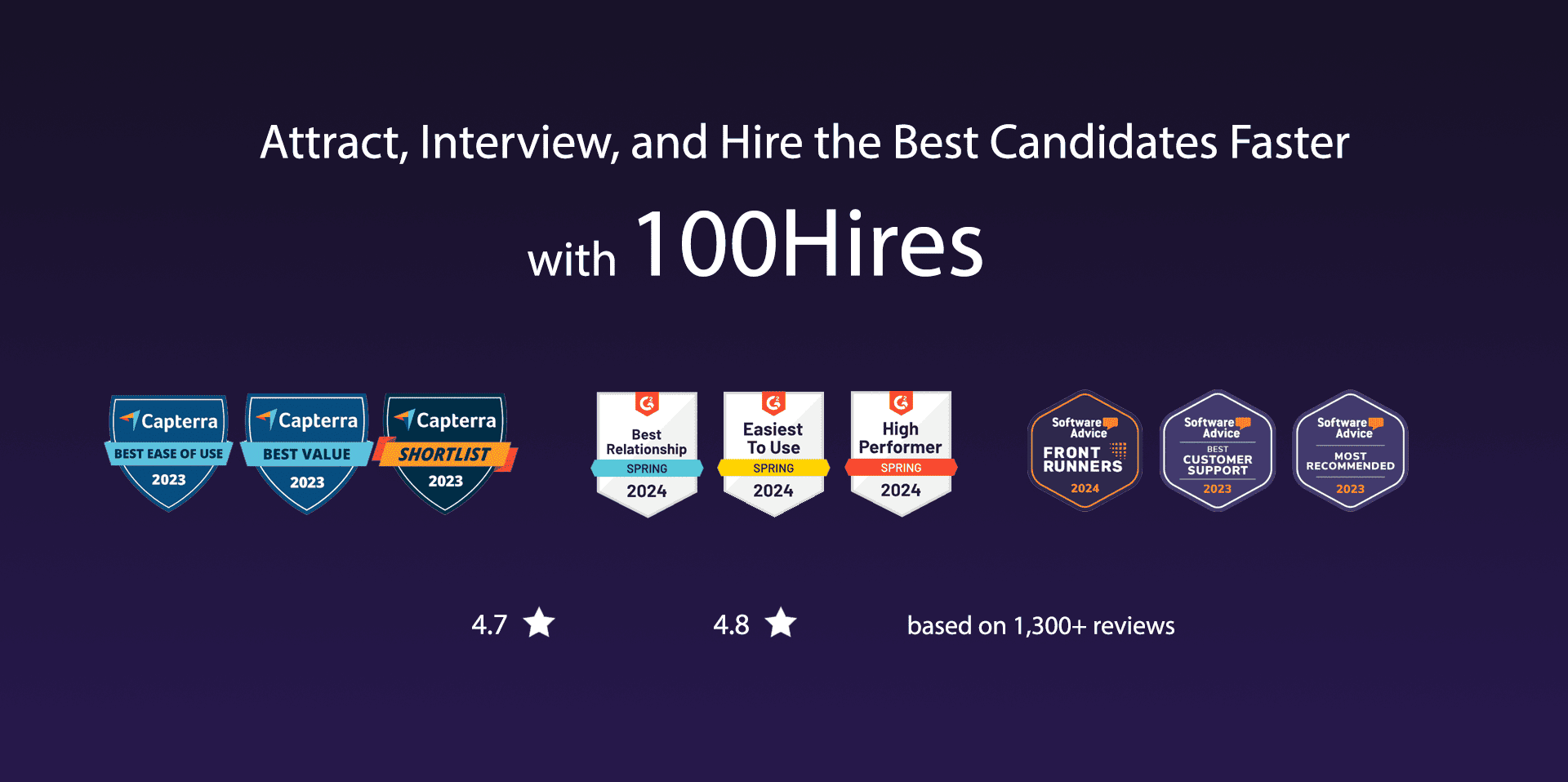
G2 rating: 4.8/5 based on 831 reviews.
Capterra rating: 4.9/5 based on 742 reviews.
1. Enhanced Candidate Sourcing and Outreach:
-
Efficiently import candidates from LinkedIn, GitHub, and other platforms with a browser extension, improving sourcing speed and reach.
-
Access up to 37% more personal emails and phone numbers using a multi-level contact finder, enabling more personalized outreach.
-
Automated, multichannel follow-ups (emails, SMS) and email warmup features boost response rates and help maintain consistent candidate engagement.
2. Centralized Candidate Management:
-
A comprehensive database keeps all candidate information accessible and organized, reducing duplicate communication.
-
Track interaction history and application statuses in one place, ensuring that candidates are effectively moved through the pipeline.
3. Time Savings with AI-Driven Tools:
-
AI-powered tools generate job descriptions, rank candidates, and screen resumes, streamlining administrative tasks so recruiters can focus on high-value activities.
-
Automated candidate matching helps prioritize the best candidates, saving time on manual screening.
4. Automation to Streamline Workflows:
-
Integrate Google or Outlook calendars for simplified scheduling across time zones, eliminating the hassle of manual interview coordination.
-
Automate reminders, follow-ups, and candidate updates to maintain clear communication and optimize the hiring timeline.
100Hires Pricing:
100Hires offers three pricing tiers: Start at $75/month (billed annually) for companies with minimal hiring needs, supporting up to 3 jobs and 1 user. The Advanced plan, at $199/month, includes unlimited jobs, candidates, and users, plus features like automated emails and a custom domain. The Pro plan, at $399/month, adds advanced sourcing tools, contact enrichment, and onboarding support, ideal for sourcing passive candidates.
Gem, founded in 2017, is a recruitment software that raised $148 million.
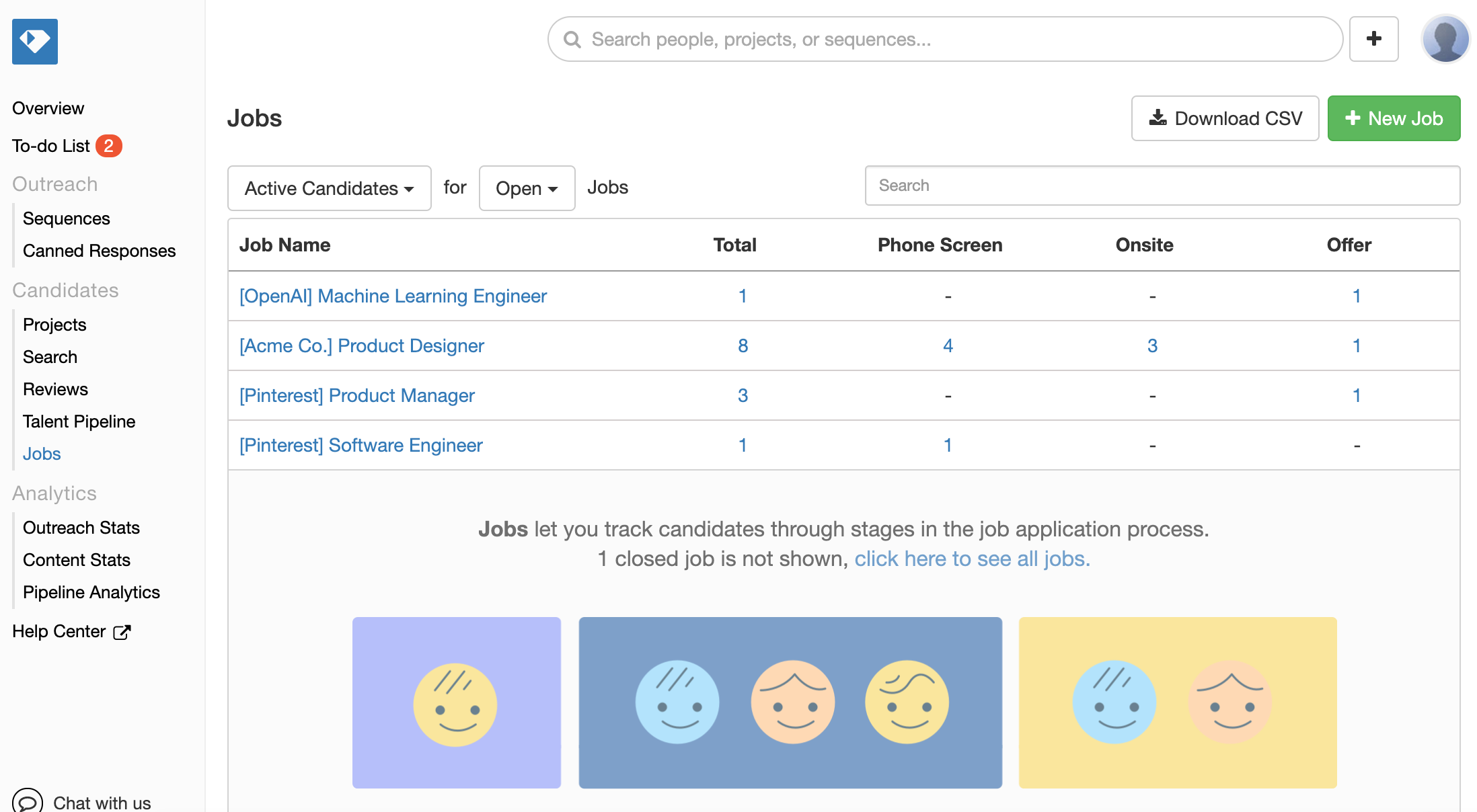
G2 rating: 4.8/5 based on 221 reviews.
Capterra rating: 4.7/5 based on 120 reviews.
Gem’s typical customers are primarily based in the United States (61.89%), with smaller shares in India (14.95%), Canada (5.09%), the United Kingdom (2.03%), and Singapore (1.93%). Key industries include Computer Software (29%), Staffing and Recruiting (13%), Information Technology and Services (8%), Human Resources (7%), and Internet (5%).
According to G2, 48% of customers have 51-1000 employees, 34% have more than 1000 employees, and 14% have fewer than 50 employees. Capterra reviews show 20.2% of customers with 1,001-5,000 employees, with smaller shares across other size categories. Gem helps keep the hiring team engaged throughout the recruitment process, enhancing collaboration and ensuring successful hiring outcomes.
Gem Pricing:
Gem's pricing is estimated between $3,600 and $4,000 per user per year, billed annually. Pricing can vary based on geography, company size, and industry.
Gem Pros:
- Ease of Use and User-Friendly Interface (mentioned 31 times): Gem is praised for its intuitive and simple interface, making it easy to navigate and use for daily tasks, project management, and sequence setup.
- Integration Capabilities (mentioned 26 times): Users value Gem's ability to integrate smoothly with platforms like LinkedIn, various ATS systems like Greenhouse, and email services, enhancing workflow and data accessibility.
- Automated Outreach and Sequences (mentioned 25 times): The platform's automated email and InMail sequences facilitate effective candidate engagement through personalized, scheduled follow-ups, highly appreciated for saving time.
Gem Cons:
- Email Accuracy and Scraping Issues (mentioned 12 times): Users frequently mention that email addresses provided by Gem can be inaccurate or outdated, affecting the effectiveness of outreach efforts.
- Integration Challenges (mentioned 11 times): Some users face difficulties with integrating Gem with ATS systems or LinkedIn, particularly around automating InMail sequences and syncing data accurately.
- Learning Curve and Usability (mentioned 9 times): A few users find the interface clunky or not intuitive, and mention a steep learning curve, requiring extensive training or support to master.
- Manual Processes and Inefficiencies (mentioned 8 times): There are complaints about the need for manual intervention in various tasks, such as sending InMails, downloading candidate information, and managing candidate statuses manually.
- Reporting and Dashboard Limitations (mentioned 7 times): Users find some of the reporting dashboards glitchy or limited in functionality, making it difficult to customize reports or extract meaningful data easily.
- Customer Support Issues (mentioned 6 times): Some users express dissatisfaction with customer support, either due to a lack of understanding of the product or slow response times.
- Cost Concerns (mentioned 5 times): Users mention that Gem can be quite expensive, especially considering some of the limitations in functionality and the additional costs for accessing certain features.
- Limited Search and Filter Options (mentioned 4 times): Users desire more advanced search functionalities and filter options, particularly for managing large volumes of candidates or specific sourcing needs.
- Lack of Full Automation (mentioned 3 times): Users wish for more automated features, especially for tasks like sending InMails, managing follow-ups, and updating candidate statuses without manual input.
- Performance Issues with Large Data Sets (mentioned 2 times): There are complaints about Gem's performance when handling large CSV files or when integrating large amounts of data, leading to slowdowns or errors.
HireEZ, founded in 2015, is a recruitment software that raised $45.5 million.
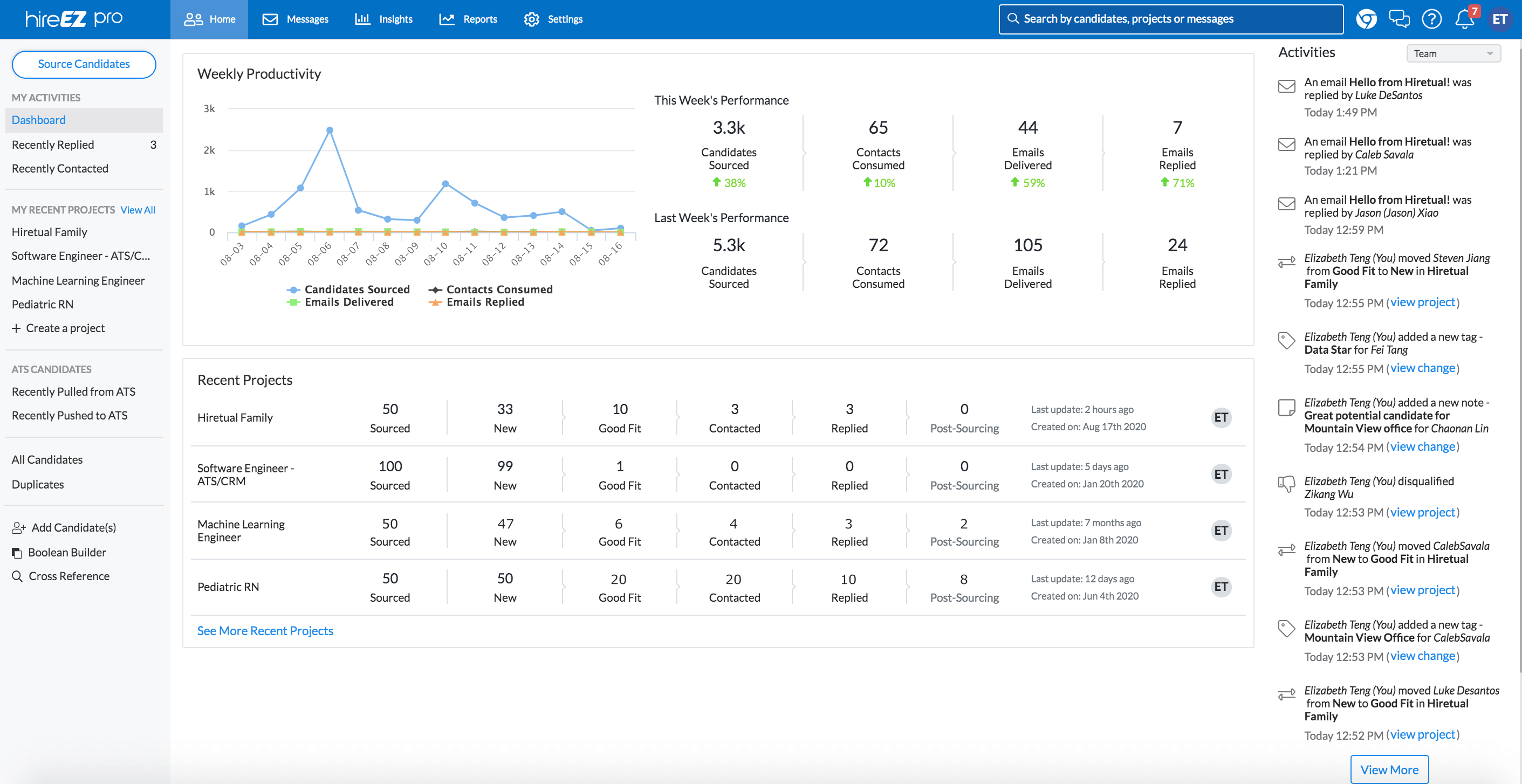
G2 rating: 4.6/5 based on 248 reviews.
Capterra rating: 4.7/5 based on 91 reviews.
HireEZ’s typical customers are primarily based in the United States (41.72%), with significant shares in India (18.99%), Belgium (9.85%), Canada (6.06%), and the United Kingdom (3.86%). Key industries include Staffing and Recruiting (21%), Human Resources (20%), Computer Software (8%), Information Technology and Services (7%), and Internet (6%).
HireEZ supports the recruitment of top talent for building a strong senior leadership team, which is crucial for organizational growth and strategic direction.
According to G2, 48% of customers have 51-1000 employees, 30% have fewer than 50 employees, and 22% have more than 1000 employees. Capterra reviews show 19.8% of customers with 1-10 employees, with smaller shares across other size categories.
HireEZ Pricing:
hireEZ offers a range of pricing options, with a free 15-day trial for all features. The Startups Plan is available at $169 per user per month for SMBs, including Boolean search, 100 contacts, and email management for up to three users. The Professional Plan starts at $199 per user per month, with enhanced capabilities over the Startups Plan. Annual subscriptions begin around $7,000 per year, offering 4,000 monthly credits and additional premium features, while custom pricing is available for larger needs.
HireEZ Pros:
- Ease of Use (18 mentions): Users frequently highlight the ease of use of HireEZ's interface, making it straightforward to navigate and operate.
- Email Sequences and Campaigns (17 mentions): Many appreciate the ability to create automated email sequences and campaigns, which helps in engaging candidates efficiently and tracking responses.
- Effective Sourcing with AI and Boolean Searches (15 mentions): HireEZ is praised for its AI-driven search capabilities and the ability not to rely on complex Boolean strings, making candidate sourcing more effective.
HireEZ Cons:
- Inaccurate Data and Outdated Profiles (18 mentions): Users reported receiving inaccurate candidate data, outdated profiles, or incorrect contact information, affecting their sourcing effectiveness.
- Issues with Email Sequencing and Response Rates (14 mentions): Complaints about email sequencing issues, such as emails not being sent to all intended recipients, and lower than expected response rates were common.
- Integration Challenges (11 mentions): Users faced difficulties with integrating HireEZ with other systems, such as ATS/CRMs, and expressed a desire for broader integration capabilities.
- Cost Concerns (9 mentions): Several users expressed concerns about the tool's pricing, including unexpected price increases and a desire for more flexible pricing options.
- Limited Functionality in Certain Areas (8 mentions): Users desired more functionality, including better analytics, more sophisticated search options, and additional features like text messaging.
- Difficulty with User Interface and Learning Curve (6 mentions): Some users found the user interface unintuitive and mentioned a steep learning curve for mastering the tool.
- Limited Candidate Reach and Search Effectiveness (6 mentions): Users noted limitations in the tool’s ability to reach candidates, particularly with features like the "High Availability" filter not performing as well as expected.
- Customer Support and Training Issues (4 mentions): While generally praised, some users felt that customer support could be improved, and better training could be provided.
- Inconsistent AI and Boolean Search Capabilities (4 mentions): Some users experienced inconsistencies with the AI and Boolean search capabilities, affecting the precision of candidate searches.
- General Dissatisfaction with Minor Bugs and Glitches (3 mentions): A few users mentioned encountering minor bugs and glitches, though this was less frequently cited compared to other issues.
Interseller, founded in 2016, is a recruitment software based in Argentina that was acquired by Greenhouse Software.
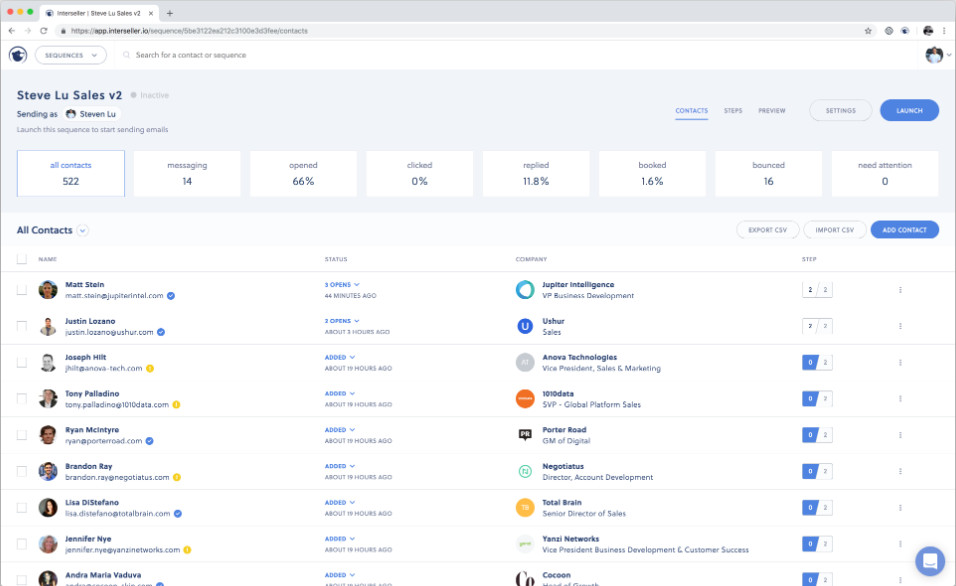
G2 rating: 4.7/5 based on 210 reviews.
Capterra rating: /5 based on reviews.
Interseller's typical customers are primarily based in the United States (49.35%), with significant shares in the United Kingdom (17.96%), India (11.47%), Switzerland (10.95%), and Germany (3.66%).
According to G2, 82% of customers have fewer than 50 employees, 16% have 51-1000 employees, and 2% have more than 1000 employees.
Interseller Pricing:
Starting April 1, 2024, Interseller will no longer offer custom or legacy subscription plans. New and reactivating users will be placed on the Recruiter plan at $200 per user/month, which includes 250 lookups, email sequence sending, and the ability to search for work and personal emails via Chrome extension or CSV import.
Interseller Pros:
- Ease of Use and Simple Interface (mentioned 13 times): Users find the interface simple and intuitive, which makes the tool easy to learn and use. Features like email sequence setup, CSV uploads, and customization are user-friendly and accessible.
- Integration with Other Platforms (mentioned 12 times): Interseller's seamless integration with CRM systems, LinkedIn, Greenhouse, Outlook, Zapier, and ATS tools allows for a streamlined workflow, enabling effective management of sourcing and outreach tasks.
- Email Prospecting and Campaign Automation (mentioned 10 times): Users appreciate Interseller's email prospecting features, which allow for easy finding of email addresses and the automatic addition of contacts to campaigns directly from LinkedIn. The email automation features enable personalized messaging and effective follow-up.
Interseller Cons:
- Incorrect Email Data and Limited Contact Details (mentioned 10 times): Users reported frequent inaccuracies in email data, including incorrect or outdated email addresses and limited contact information. Many expressed a desire for more accurate data.
- High Costs and Pricing Structure (mentioned 6 times): Users found the tool to be expensive, particularly for the volume of contacts and lookups offered. They also expressed dissatisfaction with the "use 'em or lose 'em" pricing structure and suggested rollover credits.
- Integration and Synchronization Issues (mentioned 5 times): Some users experienced problems with integrations, such as syncing with their CRM or ATS systems, outdated browser compatibility, and issues with LinkedIn integration.
- Limited Features and Functionality (mentioned 4 times): Some users felt the tool lacked certain features, such as phone number finding, a "notes" field for contacts, email templates, and more robust reporting.
- Manual Work and Workflow Limitations (mentioned 4 times): Users pointed out that adding contacts and managing workflows required too much manual work. Some mentioned the lack of automation for follow-ups and the inability to easily add custom steps like calls.
- User Interface and Workflow Issues (mentioned 3 times): The user interface was criticized for its quirks, such as the inability to delete old campaigns and visual design issues. Some users also found the workflow for candidates without available emails cumbersome.
- Email Lookup Limitations (mentioned 3 times): Users reported that email lookups are slow, don't always handle non-ASCII characters well, and sometimes struggle to find emails for profiles.
- Feature Focus and Product Roadmap (mentioned 2 times): Some users expressed concerns that Interseller's focus on integrating with Greenhouse has detracted from their ability to improve the existing product or add new features.
- Learning Curve and User Experience (mentioned 2 times): Some users found the learning curve steep, while others mentioned that the UI could benefit from more intuitive navigation.
- No Major Complaints (mentioned 2 times): A few users expressed complete satisfaction, stating that there was nothing they disliked about the tool.
LinkedIn Recruiter, founded in 2002, is a recruitment software.
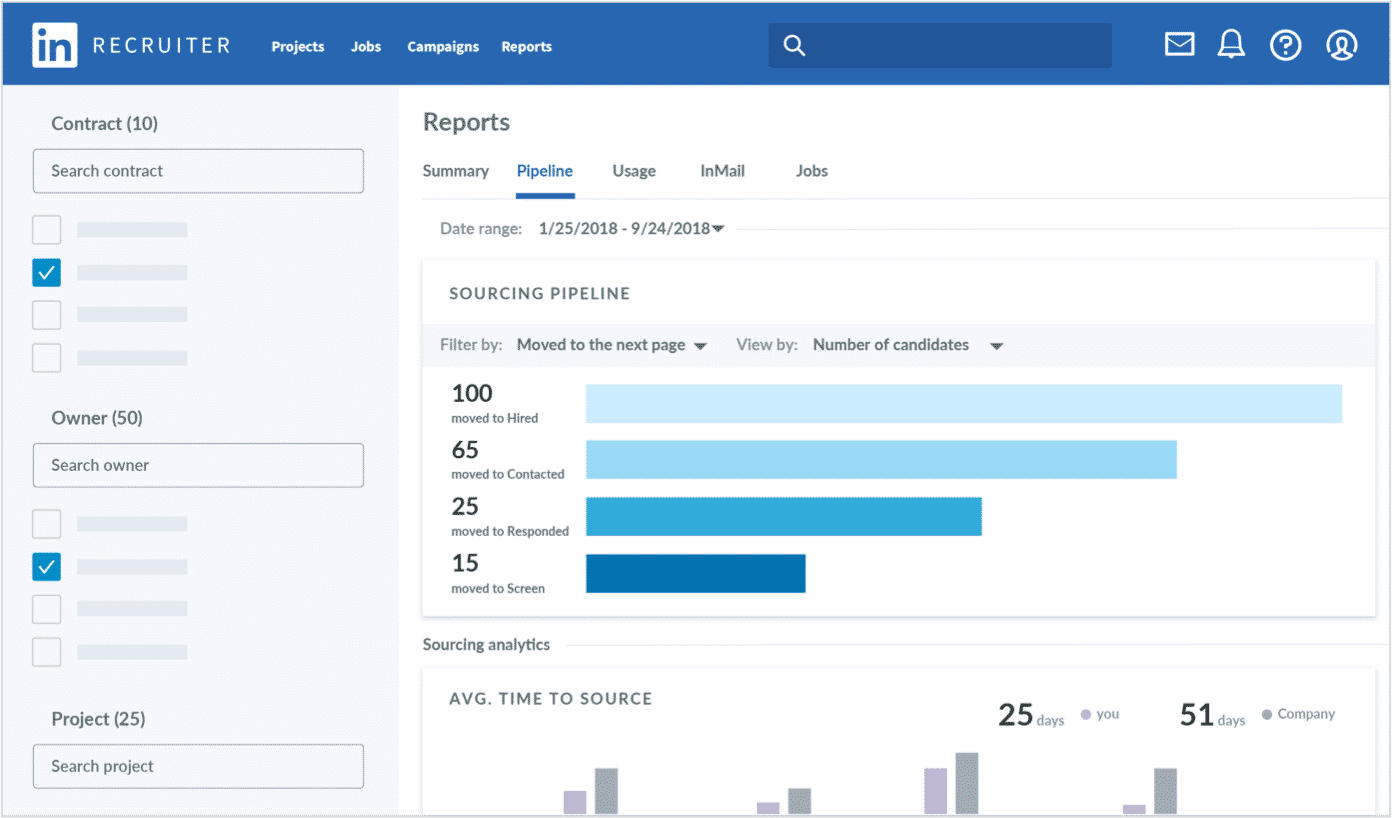
G2 rating: 4.4/5 based on 366 reviews.
Capterra rating: 4.6/5 based on 101 reviews.
LinkedIn Recruiter's typical customers are primarily based in the United States (29.98%), with significant shares in India (10.51%), the United Kingdom (6.86%), Brazil (4.78%), and Canada (4.27%). Key industries include Staffing and Recruiting (22%), Human Resources (10%), Information Technology and Services (10%), Health, Wellness and Fitness (4%), and Education Management (4%).
According to G2, 48% of customers have 51-1000 employees, 34% have fewer than 50 employees, and 18% have more than 1000 employees. Capterra reviews show 21.1% of customers with 1-10 employees and 21.1% with 51-200 employees, along with smaller shares across other size categories.
Linkedin Recruiter Pricing:
LinkedIn offers three main plans:
Recruiter Lite: Costs $170/month for a single license or $270/month per license for 2-5 seats ($1,680/year for a single license or $2,670/year per license for 2-5 seats). It provides access up to the user’s 3rd-degree network, 20+ filters, 30 InMail messages per month, limited collaboration (up to 5 seats), and does not include ATS integration or advanced reporting.
Recruiter Professional Services: Aimed at staffing firms, this plan includes full network access, 40+ filters, 100 InMail messages per month, pooled InMails, bulk messaging, advanced collaboration features, ATS integration with 28+ partners, and extensive reporting. Contact Sales for pricing.
Recruiter Corporate: Designed for corporate companies, this plan offers full network access, 150 InMail messages per month, comprehensive collaboration, ATS and LinkedIn integrations, advanced reporting, and OFCCP tracking. Contact Sales for pricing.
Linkedin Recruiter Pros:
- Advanced Search Capabilities (mentioned 38 times): Users praise LinkedIn Recruiter for its robust search functionalities, including Boolean search, various filters, and the ability to be very granular in targeting candidates, which allows them to efficiently find specific talent.
- User-Friendly Interface and Ease of Use (mentioned 32 times): The platform is noted for its intuitive and easy-to-navigate interface, making it accessible for users to manage their recruitment processes effectively.
- Effective Candidate Outreach and Messaging (mentioned 31 times): The InMail feature and the ability to message candidates directly through the platform are highly valued for engaging potential candidates and maintaining communication.
Linkedin Recruiter Cons:
- High Cost (mentioned 25 times): Users frequently cite the expense of LinkedIn Recruiter as a significant downside, noting that it is pricier compared to other platforms and the costs can add up quickly, especially with premium features.
- Limited Search/Filter Accuracy and Options (mentioned 20 times): Some users find the search filters and boolean search options limited or inaccurate, particularly with features like "years of experience" and industry-specific searches that do not always meet user needs.
- Technical Issues and Glitches (mentioned 18 times): Users report occasional technical glitches and system crashes, especially when using advanced search functions or managing large amounts of data.
- Inadequate Candidate Information and Outdated Profiles (mentioned 15 times): There are complaints about incomplete or outdated candidate profiles, which can hinder the recruitment process.
- InMail Limitations (mentioned 14 times): Users dislike the limitations on the number of InMails they can send, especially given the platform's high cost. There are also mentions of the challenges with response rates and the management of InMail credits.
- Interface and Usability Issues (mentioned 12 times): Some users find the user interface less intuitive or encounter difficulties with certain functionalities like the inbox or messaging system.
- Integration and Compatibility Issues (mentioned 10 times): Challenges with integrating LinkedIn Recruiter with other systems or ATS (Applicant Tracking Systems) are mentioned, along with frustrations about the compatibility with various recruitment workflows.
- Limited Access to Full Candidate Details (mentioned 8 times): Users express frustration over the inability to access full contact details or complete profiles without additional payments or unlocking credits.
- Customer Support Concerns (mentioned 7 times): Slow response times and inadequate support from the LinkedIn team are points of dissatisfaction among some users.
- Overwhelming Amount of Profiles and Information (mentioned 5 times): A few users feel overwhelmed by the sheer volume of profiles and information available, which can make it challenging to navigate and find relevant candidates efficiently.
Nymeria, founded in 2017, is a recruitment software.
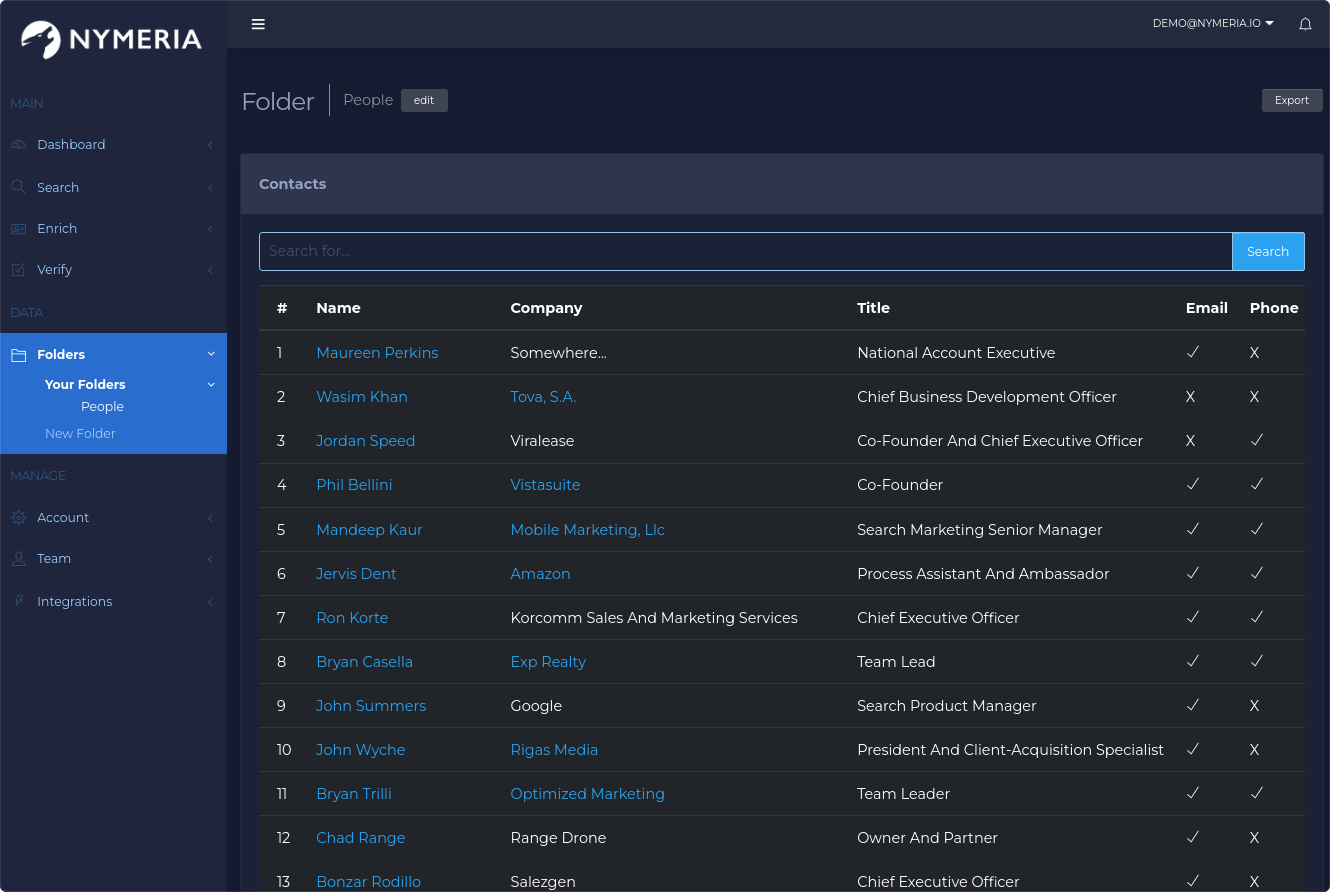
G2 rating: 4.7/5 based on 6 reviews.
Capterra rating: /5 based on reviews.
Nymeria's typical customers are primarily based in India (36.66%), with significant shares in the United States (17.3%), Romania (16.87%), Canada (6.87%), and the United Kingdom (4.19%).
According to G2, 83.3% of customers have between 51-1000 employees, while 16.7% have fewer than 50 employees.
Nymeria Pricing:
Nano: $39/month, includes 100 credits per month, unlimited team members, and access to search, bulk, and API.
Micro: $79/month, includes 300 credits per month, unlimited team members, and access to search, bulk, and API.
Kilo: $159/month, includes 1,000 credits per month, unlimited team members, and access to search, bulk, and API.
Custom: Pricing available upon request, includes bulk credits up front, customizable data fields, premium support, unlimited team members, and access to search, bulk, and API.
Nymeria Pros:
- Ease of Use (Mentioned 4 times). Users appreciate the tool's simplicity and effectiveness, especially in integrating seamlessly with other platforms.
- Superior Access to Contact Information (Mentioned 3 times). Nymeria offers more access to personal contact information compared to competitors like Lusha and ZoomInfo, making it a preferred choice for users.
- Seamless Extension Integration (Mentioned 2 times). Users love the ease with which the extension integrates with other software, enhancing user experience.
Nymeria Cons:
- Concerns Over Accuracy (Mentioned 3 times). Users have raised concerns about the accuracy of the contact information provided, noting that it can often be outdated.
- Desire for More Up-to-Date Information (Mentioned 2 times). There's a wish for the tool to have more current emails, as many are outdated and lead to bounced messages.
- No Negatives for Some Users (Mentioned 1 time). A user reported having no negative experiences, finding the tool fast and user-friendly.
- Interface Usability Issues (Mentioned 1 time). A user mentioned difficulty with the interface, specifically that contact points are too close together and change order unexpectedly, leading to selection errors.
- Bugs and Downtime (Mentioned 1 time). Users have experienced bugs and downtime, with specific mention of often incorrect professional emails.
- Emails Sometimes Outdated (Mentioned 1 time). There's a repetition of the concern that emails provided by the tool can be outdated and unreliable.
Seekout, founded in 2017, is a recruitment software that raised $188.6 million and was last valued at $1.2 billion. The company recently laid off 30% of its workforce.
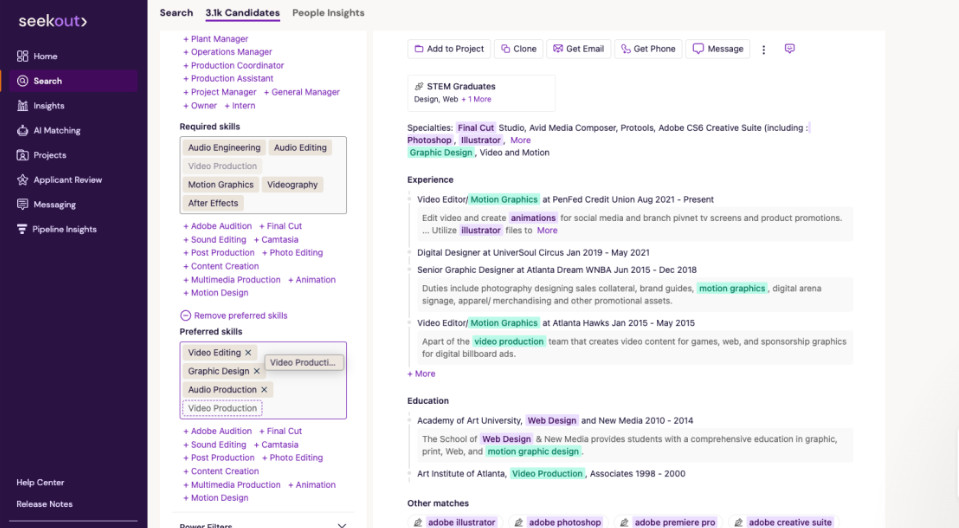
G2 rating: 4.5/5 based on 758 reviews.
Capterra rating: 4.7/5 based on 188 reviews.
SeekOut's typical customers are primarily based in the United States (47.87%), with significant shares in Canada (13.79%), India (10.93%), the United Kingdom (5.26%), and France (2.43%). Key industries include Human Resources (15%), Computer Software (14%), Staffing and Recruiting (13%), Information Technology and Services (10%), and Retail (4%).
According to G2, 66% of customers have more than 1000 employees, 20% have 51-1000 employees, and 14% have fewer than 50 employees. Capterra reviews show 42.2% of customers with 10,001 or more employees, along with smaller shares across other size categories.
Seekout Pricing:
SeekOut offers flexible pricing starting at $1,200 per month, with basic plans beginning at $499, Pro plans at $999, and Enterprise plans at $1,999 per month. Annual pricing averages around $5,500, though custom options are available for larger needs. SeekOut’s Professional plan targets individuals and small teams with candidate search tools, while the Enterprise plan adds AI-assisted search and team collaboration features. The Ultimate plan enhances recruitment with tools like Applicant Review and Pipeline Insights, and the Grow package focuses on internal talent management.
Seekout Pros:
- Diversity and Power Filters (mentioned 12 times): Users appreciate the ability to source diverse candidates and the detailed, customizable filters that allow for strategic sourcing initiatives.
- Comprehensive Candidate Profiles from Multiple Sources (mentioned 10 times): SeekOut's aggregation of candidate profiles from various platforms, including LinkedIn, GitHub, and publications, is highly valued for providing a comprehensive view of candidates.
- AI and Advanced Boolean Search Capabilities (mentioned 9 times): The AI search features and the ability to use advanced Boolean strings for precise candidate searches are highlighted as particularly useful.
Seekout Cons:
- Outdated or Inaccurate Candidate Information (mentioned 3 times): Users note that candidate profiles can sometimes be outdated or not match their current status on LinkedIn.
- Limited Diversity Recruiting Efficiency (mentioned 2 times): Some users wish for stronger and more efficient diversity recruiting capabilities.
- Time-Consuming Contact Information Retrieval (mentioned 1 time): Users find it time-consuming to grab contact information in bulk, especially for high-volume sourcing.
- Email Messaging UI/UX (mentioned 1 time): Some users feel the email messaging tool's user interface and user experience could be improved and find it a bit outdated compared to other tools.
- Integration Issues (mentioned 1 time): There are compatibility issues with some company systems, particularly with email campaigns feature due to restrictions with Microsoft email accounts.
- Bugs and Glitches (mentioned 1 time): Users have encountered bugs, but appreciate the prompt response from the SeekOut team to fix these issues.
- LinkedIn Integration Limitations (mentioned 1 time): Users wish for better integration with LinkedIn, especially for those without a premium LinkedIn subscription.
- Clunky Communication Functions (mentioned 1 time): The communication functions within SeekOut are described as a bit clunky by some users.
- Steep Learning Curve (mentioned 1 time): For some users, there is a steep learning curve to fully utilize all of SeekOut's features effectively.
- Desire for More Integration with CRMs and ATSs (mentioned 1 time): Users express a desire for SeekOut to integrate more seamlessly with their current CRM and ATS systems for a smoother workflow.
SignalHire, founded in 2016, is a recruitment software based in Poland.
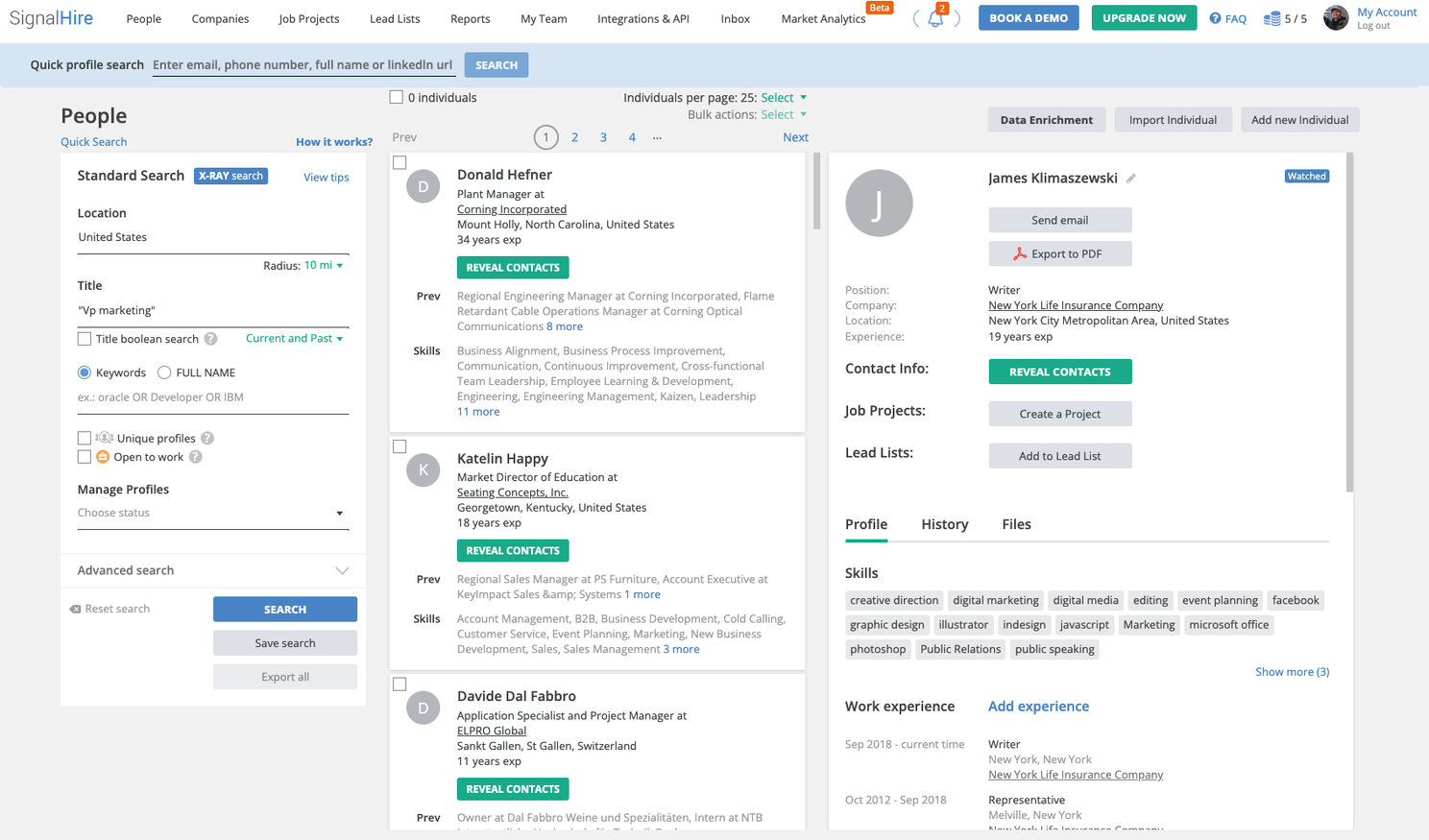
G2 rating: 3.6/5 based on 44 reviews.
Capterra rating: 4.4/5 based on 33 reviews.
SignalHire's typical customers are primarily based in the United States (29.67%), with significant shares in India (20.49%), Canada (6.2%), Australia (5.59%), and Indonesia (2.49%). Key industries include Staffing and Recruiting (22%), Human Resources (15%), Information Services (11%), Marketing and Advertising (7%), and Computer Software (7%).
According to G2, 65.9% of customers have fewer than 50 employees, 26% have between 51-1000 employees, and 7.3% have more than 1000 employees. Capterra reviews indicate that 37.5% of customers have 1-10 employees, with smaller shares across other size categories.
Signalhire Pricing:
Free: $0/month, includes 5-10 credits monthly.
Emails: $49/month for 350 credits, providing email-only access, CSV export, team management, and API access.
Phones: $49/month for 100 credits, focused on phone numbers with similar features to the Emails plan.
Emails & Phones: $49/month for 100 credits, includes both emails and phone numbers.
Scale: Custom pricing, designed for large-scale prospecting with unlimited users and advanced features.
Signalhire Pros:
- Ease of Use and User-Friendly Interface (mentioned 15 times): Users appreciate SignalHire for its intuitive and easy-to-navigate design, making it accessible and simplifying the recruitment process.
- Accurate Contact Information (mentioned 14 times): The tool is praised for providing precise and reliable contact details, including emails and phone numbers, which significantly aid in lead generation and recruitment efforts.
- Effective LinkedIn Integration (mentioned 12 times): SignalHire's seamless integration with LinkedIn, especially through its Chrome extension, allows users to easily find and extract contact information from LinkedIn profiles.
Signalhire Cons:
- Accuracy Issues (mentioned 14 times): Many users reported that the accuracy of the contact information is low, with a significant number of emails and phone numbers being outdated or incorrect.
- Loss of Unused Credits (mentioned 7 times): Users are frustrated by the loss of unused credits at the end of the subscription period, which does not roll over to the next month if not renewed.
- High Cost and Limited Free Credits (mentioned 6 times): The cost of the tool is considered high by some users, and the limited number of free credits (only 10) is not enough to adequately evaluate the tool’s effectiveness.
- Confusing Initial Interface (mentioned 5 times): The initial interface can be confusing for new users, requiring time and experience to get used to it.
- Subscription-Based Pricing Complications (mentioned 5 times): The subscription model, which requires users to pay for a fixed number of credits per month, is seen as inflexible and complicated for varying usage needs.
- Technical Issues and Crashes (mentioned 4 times): Users experienced frequent crashes and technical issues, which required contacting support for resolutions.
- Customer Service Problems (mentioned 4 times): Some users reported unresponsive or unhelpful customer service, particularly when dealing with subscription issues or technical problems.
- Data Management and Filter Limitations (mentioned 3 times): The data management and search filters are seen as needing improvement to be more effective and user-friendly.
- Privacy and Security Concerns (mentioned 2 times): Concerns were raised about the permissions required by the Chrome extension, including access to authentication data, which caused some users to stop using the tool.
- Deduction of Credits for Incomplete Information (mentioned 2 times): Users are dissatisfied with the tool deducting credits even when no contact details are found or only providing LinkedIn profile links.
SourceWhale, founded in 2019, is a recruitment software based in the United Kingdom.
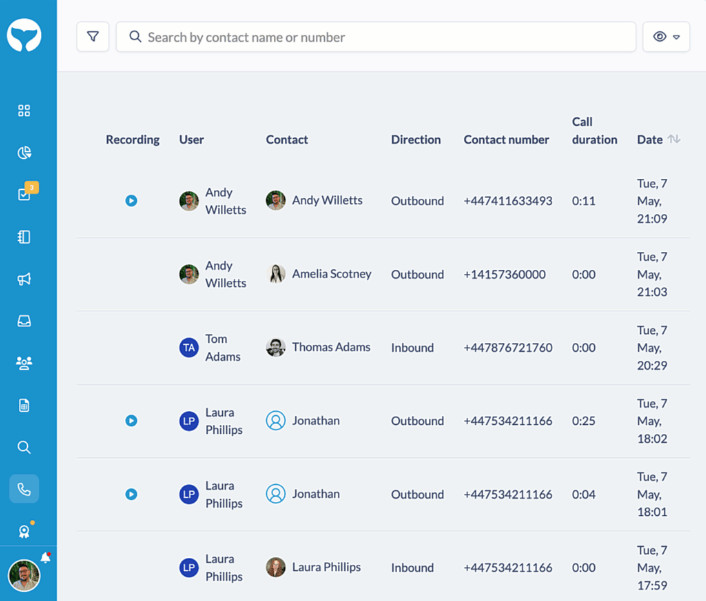
G2 rating: 4.9/5 based on 144 reviews.
Capterra rating: 4.3/5 based on 4 reviews.
SourceWhale's typical customers are primarily based in the United Kingdom (51.82%), with significant shares in the United States (27.57%), India (15.46%), Germany (1.88%), and Australia (1.77%). The key industries represented include Computer Software (25%), Hospital & Health Care (25%), Staffing and Recruiting (25%), and Human Resources (25%).
According to G2, 88% of customers have fewer than 50 employees, while 10% have between 51-1000 employees, along with smaller shares across other size categories. Capterra reviews indicate that 75% of customers have 1-10 employees, with 25% having between 201-500 employees.
SourceWhale Pricing:
SourceWhale’s pricing typically falls around $3,000 per user annually, with packages often ranging between $2,500 and $3,500 per user per year based on selected features and user count. The basic package, including website building and analytics, is priced at $499, while custom quotes are provided for tailored needs. Some users report monthly licensing at approximately $195–$250, with additional costs for extra email credits. SourceWhale does not offer a free trial or free version.
SourceWhale Pros:
- Time-saving and automation (12 mentions): Allows for easy setup of automated email campaigns and sequences, reducing manual outreach efforts and saving time with LinkedIn and CRM integrations.
- User-friendly and intuitive platform (12 mentions): A straightforward and intuitive UI that simplifies campaign creation, making it accessible for non-technical users.
- Effective outreach and response rates (11 mentions): Enables personalized messaging and efficient targeting, improving response rates for business development and sourcing candidates.
SourceWhale Cons:
- No Dislikes (mentioned 14 times): Many users expressed satisfaction with SourceWhale, highlighting its effectiveness and stating that they have no significant complaints or dislikes about the tool.
- LinkedIn InMail Automation (mentioned 5 times): Users desire improved automation of LinkedIn InMail actions, seeking smoother workflows for sending InMails and better integration with campaigns.
- Integration Issues (mentioned 4 times): Some users experienced challenges with integrating SourceWhale into their existing ATS or CRM systems, noting discrepancies in data syncing and overall connectivity.
- Manual Processes (mentioned 4 times): Users mentioned that some aspects, particularly those related to LinkedIn InMails and outreach, require more manual effort than they would like.
- Data Quality (mentioned 4 times): Users highlighted issues with data quality, including outdated or missing information that affected outreach and engagement efforts.
- User Interface (mentioned 3 times): Certain users reported issues with the platform’s user interface, such as slow performance or a cumbersome experience that can hinder productivity.
- Limited Phone Number Functionality (mentioned 2 times): Users requested improved phone number features, such as better handling of direct numbers and the ability to dial directly from the platform.
- Campaign Management (mentioned 2 times): Users expressed the need for better campaign automation, particularly regarding LinkedIn responses affecting campaigns and ensuring new campaigns remain in 'pause' mode until activated.
- Video Integration (mentioned 1 time): There was a request for better video integration, particularly with external tools like Vidyard, to gather detailed analytics and insights.
- Search Functionality (mentioned 1 time): One user suggested adding or enhancing search functionality within the platform to improve efficiency and effectiveness.
Swordfish, founded in 2019, is a recruitment software.
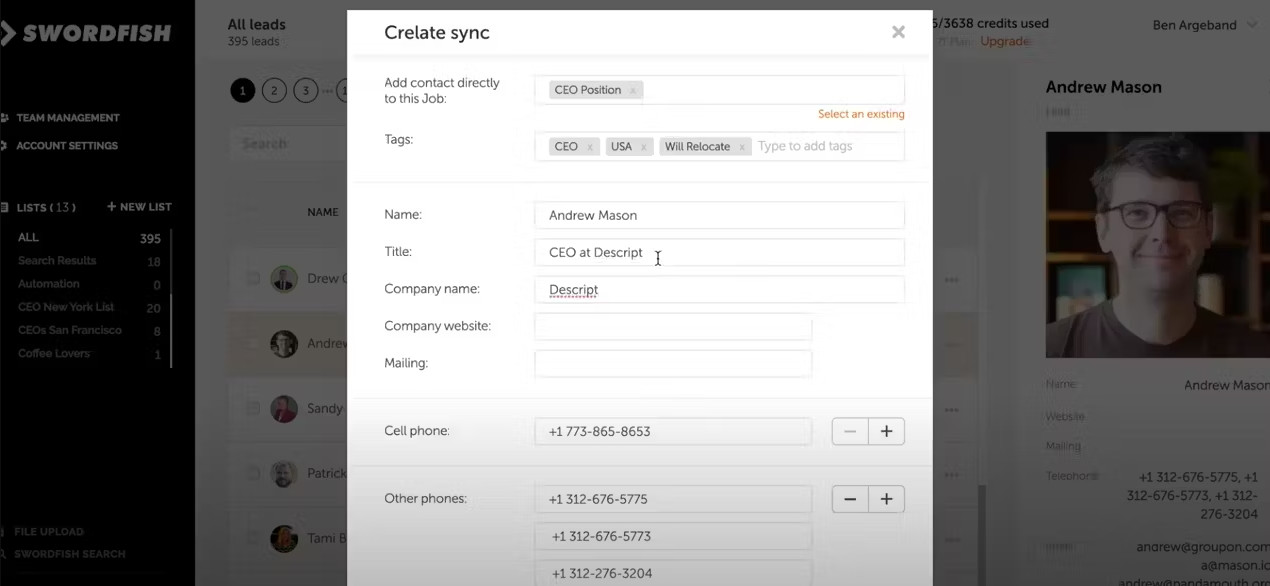
G2 rating: 4.5/5 based on 85 reviews.
Capterra rating: 4.6/5 based on 12 reviews.
Swordfish's typical customers are primarily based in the United States (25%), with significant shares in India (11.58%), the Philippines (8.3%), Australia (6.9%), and South Africa (6.47%). The key industries represented include Human Resources (25%), Marketing and Advertising (17%), Legal Services (8%), Financial Services (8%), and Architecture & Planning (8%).
According to G2, 84% of customers have fewer than 50 employees, while 14% have between 51-1000 employees, and 2% have more than 1000 employees. Capterra reviews indicate that 50% of customers have 1-10 employees, with smaller shares across other size categories, including 16.7% for self-employed and for those with 11-50 employees.
Swordfish Pricing:
Swordfish offers several pricing tiers, beginning with a free 7-day trial that includes 5 credits. The Starter plan provides 100 credits at $99 per user per month, while the Starter Plus plan offers 300 credits for $199 per user per month. Custom pricing is available for more extensive usage needs.
Swordfish Pros:
- Ease of Use (10 mentions): Many users praised the tool's ease of use, noting the simple and user-friendly interface and seamless Chrome extension integration.
- High Accuracy (9 mentions): Users appreciated the high accuracy of contact information, particularly mobile phone numbers, which were frequently around 70% accurate.
- Effective Candidate Outreach (8 mentions): Swordfish enabled users to reach more candidates and access contact details that would otherwise be difficult to obtain.
Swordfish Cons:
- Credit Limitations (8 mentions): Many users mentioned running out of credits quickly or desiring more free credits.
- Pricing (6 mentions): The tool was considered expensive by some users, with pricing options being limited or costs increasing over time.
- Accuracy of Data (5 mentions): Some users found the data to be inaccurate at times, particularly with contact information, though it was still considered better than most tools.
- Issues with Extensions and User Interface (4 mentions): The Chrome extension was considered too large or overlapping with other tools, and the SalesNav integration was not user-friendly.
- Limited Data Availability (4 mentions): Users highlighted limited or inaccurate data, especially for mobile numbers, Twitter identification, and global databases.
- Slow Speed (3 mentions): Some users experienced slow performance, particularly when searching for contact information.
- Customer Experience (3 mentions): Issues with complimentary credits, invoicing, and concerns about policies or potential scams were noted.
- GDPR and Privacy Concerns (1 mention): One user was concerned about GDPR compliance for German data, which could lead to a loss of access to certain data.
- Integration with Zapier and Bulk Upload (1 mention): Users noted the lack of phone and email verification with Zapier integration and bulk upload features.
- Extension Side Tab Position (1 mention): The Chrome extension side tab was found to overlap with other tools, making it hard to access both.
ZoomInfo TalentOS, founded in 2000, is a recruitment software that raised $8.6 million and acquired Comparably, Ringlead, Chorus.ai, Insent, EverString, Clickagy, Komiko, and Datanyze. It was acquired by DiscoverOrg.
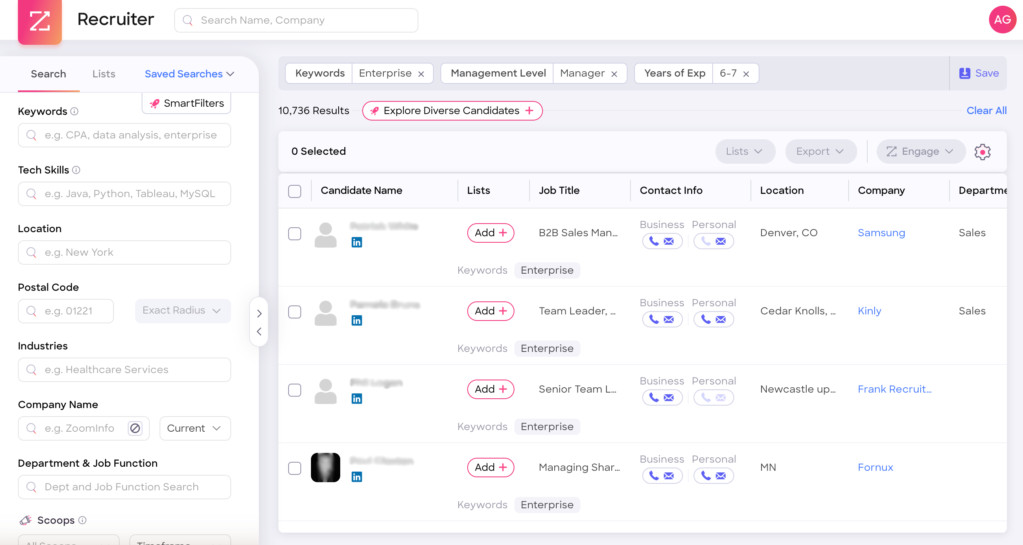
G2 rating: 4.5/5 based on 118 reviews.
Capterra rating: 4.3/5 based on 3 reviews.
ZoomInfo TalentOS's typical customers are primarily based in the United States (56.81%), with notable shares in Canada (8.92%), India (7.97%), Australia (3.37%), and the United Kingdom (2.9%). The key industries represented include Staffing and Recruiting (33%), Utilities (33%), and Public Relations and Communications (33%).
Company size distribution indicates that 66% of customers have fewer than 50 employees, while 26% have between 51-1000 employees, and 8% have more than 1000 employees, according to G2 reviews. Capterra reviews show that all customers (100%) in their data have between 51-200 employees.
ZoomInfo TalentOS Pricing:
ZoomInfo's pricing varies widely, with costs influenced by platform choice, user count, credits, and add-ons. Basic plans start around $75 per month, while standard monthly plans often begin at $1,250. Annual packages range from $15,000 for the Professional Plan to over $39,000 for the Elite Plan. Customized packages, such as the Advanced+ with data enrichment and integrations, are available starting at $50,000 annually. Pricing for ZoomInfo Talent is negotiated based on specific organizational needs and can range significantly, with enterprise accounts reported at $30,000 per year or more.
ZoomInfo TalentOS Pros: Dedicated Customer Success Managers
- Access to Contact Information (mentioned 38 times): Users appreciate the ability to obtain direct contact details, such as phone numbers and email addresses, which facilitates easier outreach to potential candidates.
- Advanced Search Capabilities (mentioned 34 times): The platform's robust search options, including Boolean searches and detailed filters, are valued for efficiently finding the right candidates across various industries and locations.
- User-Friendly Interface (mentioned 30 times): The intuitive design and user-friendly nature of ZoomInfo TalentOS make it easy for users to navigate and utilize the platform effectively.
ZoomInfo TalentOS Cons:
- Outdated or Inaccurate Data (mentioned 25 times): Users frequently mention that contact information, including phone numbers and email addresses, can be outdated or incorrect, which leads to inefficiencies and potential miscommunications.
- Integration Issues (mentioned 20 times): Some users report difficulties integrating TalentOS with other platforms like LinkedIn Recruiter or ATS systems, which can hinder seamless workflow processes.
- Limited or Incomplete Profile Information (mentioned 15 times): There are complaints about missing details in candidate profiles, such as incomplete contact information or lack of current employment status, which can complicate outreach efforts.
- Search Functionality Problems (mentioned 12 times): Users express dissatisfaction with the search functions, noting that filters do not always work as expected or that it is hard to find specific individuals even when their details should be available.
- High Cost and Contract Issues (mentioned 10 times): Concerns about the high cost of the service and issues with contract terms, such as auto-renew clauses without adequate notification, are significant pain points for some users.
- User Interface and Usability (mentioned 8 times): Several users find the user interface to be less intuitive or user-friendly than desired, particularly when searching by specific skills or navigating through the platform.
- Customer Support and Responsiveness (mentioned 5 times): Dissatisfaction with the level of customer support and the speed of response to issues are noted, which can affect user satisfaction and platform utility.
- Lead Scoring and Data Relevance (mentioned 3 times): There are concerns about the relevance and accuracy of lead scoring, particularly in fast-moving industries where data needs to be updated in real-time to remain useful.
- Limited Geographic Coverage in Search Options (mentioned 2 times): Users mention limitations in the geographic search options, which can hinder the ability to find candidates in specific, smaller locations.
- Quality of Supplementary Features (mentioned 1 time): Some users find additional features like video quality and the Engage function to be lacking, which affects the overall utility of the platform for their recruitment needs.
Customer Support and Success
Effective customer support and success are crucial when choosing a Fetcher alternative. Here are some factors to consider:
-
Dedicated Customer Success Managers: Opt for platforms that offer dedicated customer success managers. These professionals provide personalized support, helping you navigate the platform and achieve your talent acquisition goals.
-
Training and Support: Consider platforms that offer comprehensive training and support. This includes onboarding sessions, webinars, and tutorials to help you and your team get started and make the most of the platform’s features.
-
Customer Community: Look for platforms that offer a customer community. Connecting with other users allows you to share best practices, troubleshoot common issues, and gain insights from peers who are also using the platform.
-
Knowledge Base: Ensure the platform has a comprehensive knowledge base. A well-organized knowledge base provides answers to common questions, troubleshooting guides, and detailed documentation to help you resolve issues independently.
Security and Compliance
Security and compliance are critical considerations when evaluating Fetcher alternatives. Here are some key factors to keep in mind:
-
Data Security: Ensure the platform offers robust data security measures to protect your sensitive information. This includes encryption, secure data storage, and regular security audits.
-
Compliance: Consider platforms that comply with relevant regulations, such as GDPR and CCPA. Compliance ensures that your data handling practices meet legal standards and protect candidate privacy.
-
Audit Trails: Look for platforms that offer audit trails. Audit trails track changes and activity within the platform, providing transparency and accountability for all actions taken.
-
User Permissions: Ensure the platform offers user permissions to control access to sensitive information. User permissions allow you to assign roles and restrict access based on job responsibilities, enhancing data security and compliance.
the best candidates faster




